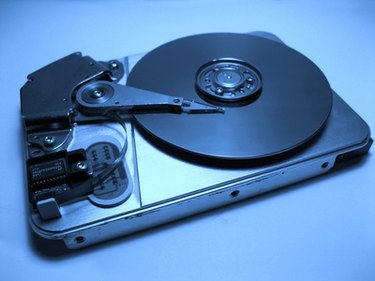
External and portable hard disk drives are computer storage devices that, unlike the primary hard disk drive, are outside the casing. Both portable and external hard disks are a way to add data storage space without having to go into the computer. Added storage is very popular in the interactive environment of the Internet where large files can be exchanged in moments. Portable and external hard disk drives are connected to computers via USB.
Noise
Video of the Day
Hard disk drives are the primary medium of data storage in a computer, and their capacities are measured in GB (gigabytes) and sometimes even TB (terabytes). The data is held on spinning discs inside the hard disk, piled on top of one another. The discs are known as platters, and may be double-sided, meaning that data can be recorded on either side of the disc. Besides the perpetually rotating discs, other movable components inside the device include actuator arms and read/write heads. A hard disk can be quite loud at times because of the presence of these movable parts. Typically, an external hard disk makes more noise than a portable hard disk.
Video of the Day
Function
External hard disks are designed for data storage, whereas portable hard disks are designed for data carriage. An external unit can be thought of as part of the computer, as a peripheral device such as a printer or scanner. Portable hard disks, on the other hand, more closely resemble thumb drives in terms of utility and function. A portable hard disk can load up on data from one computer and transfer the files to a computer in another location. An external hard disk, rather than transport data, simply add more GBs to a computer's data storage.
Size
Portable hard disks are smaller than external hard disks. A portable unit may be as small as a standard smartphone and can easily fit inside laptop carriers, backpacks, purses and pockets. External units are as large as conventional hard disk drives, but what makes the devices even bulkier is the necessity for a casing. External hard disks are usually cased in a metallic shell that covers the entire unit, with small openings for the power cable and connecting cable.
Price
External drives are usually pricier than portable hard drives because the units have more space for data storage. An external hard drive may have more space than the computer's internal unit and may even be used as the primary hard disk drive. Portable hard drives usually have much smaller data capacities.
Power
Some portable hard drives, usually the smaller ones, do need an external power source to run. The devices consume very little power, and therefore, can rely on the USB. External hard disk drives are larger devices and cannot run on power derived from USB alone; the drives are connected to an AC adapter to power up. If an external device is not plugged in to a power source, but is attached to the computer, the operating system will not recognize the drive and will not be able to access data inside it.